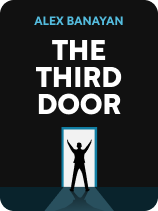

This article is an excerpt from the Shortform book guide to "The Third Door" by Alex Banayan. Shortform has the world's best summaries and analyses of books you should be reading.
Like this article? Sign up for a free trial here.
Are you hesitant to ask people for help at work? What about reaching out to people who are working in a company or a field that you aspire to?
In the process of writing his book The Third Door, Alex Banayan discovered something over and over: To become successful, you need to reach out to others for help. He shares what he learned about this from entrepreneur Elliott Bisnow and director Steven Spielberg.
Read on to learn why it’s important to tap into the expertise and connections of others.
Asking People for Help
Banayan first learned the value of asking people for help when he sought funding for his book by competing on The Price Is Right, a US television show in which contestants guess the prices of various items. He wasn’t very familiar with the show, and so didn’t know what prices to guess. However, he asked the audience for their opinions and by doing so, came up with the winning answer. The experience taught him that people are generally happy to help you if you only ask.
Another way people are happy to help, Banayan discovered repeatedly, is by providing a personal, inside connection to an industry. He finds that having an inside connection is one of the most effective ways you can further your career because such a person allows you access to opportunities you otherwise wouldn’t have. Entrepreneur Elliott Bisnow and filmmaker Steven Spielberg both had insights on the importance of finding an inside connection.
(Shortform note: Banayan isn’t the first to notice that humans like to help each other. In Behave, Robert Sapolsky writes that reciprocal altruism, or the instinct to help others without any clear and immediate reciprocation, is as innate as kin selection. He theorizes humans have evolved this way because groups in which unrelated people help each other end up stronger as a whole—for example, in primate groups, when individuals groom each other to remove insects, the entire group stays healthier. This instinct has evolved such that we like to see others be happy, even if the return on our investment is unclear. This explains the urge to, for example, help a person answer a game show question, or to act as an inside connection.)
Elliott Bisnow: Find a Mentor
Serial entrepreneur Elliott Bisnow, who rose to fame organizing celebrity-filled charity conferences, taught Banayan that one of the best ways to get help is to find a mentor. A mentor is an inside person who can not only introduce you to useful networking connections but can also guide you through tricky decisions and give you valuable advice based on their experience. Bisnow took Banayan under his wing as a mentee, and, through his valuable insights, Banayan was able to get in touch with many of the people he interviewed.
(Shortform note: A mentor is an experienced professional who’s willing to support your career development over time. They not only introduce you to contacts who can advance your career, but they also give you advice and help you navigate difficult decisions as you establish yourself. In The Success Principles, Jack Canfield notes that we often instinctively ask for advice from friends and family, but that these people might not be able to effectively answer our questions. He advises that you instead seek out proper mentors: Actively research contacts in your field with skills and expertise you need and ask them if they’d be willing to speak to you for a few minutes each month to discuss career questions.)
Steven Spielberg: An Inside Connection Can Get You Noticed
Banayan argues that Steven Spielberg, the award-winning director of some of Hollywood’s biggest blockbusters, including E.T., Jurassic Park, the Indiana Jones trilogy, and Saving Private Ryan, can credit his success to an inside connection he developed early in his career.
Chuck Silvers, a Universal Studios employee, ran into Spielberg one day as Spielberg was touring the Universal lot and took a liking to him. Silvers wrote him a pass that allowed him to return to the lot repeatedly, and later, he actively advised him. He told Spielberg to make a short film and then showed it to the vice president of production at Universal TV, who subsequently offered Spielberg a seven-year contract.
Banayan writes that Spielberg was undeniably talented, and, without that talent, his success wouldn’t have happened. But he notes that countless aspiring directors are also talented—what set Spielberg on his trajectory was that early inside connection.
| Spielberg’s Success: Luck or Skill? The randomness of Spielberg’s introduction to Silvers, and in turn, to Universal executives, brings up a question of which matters more: luck or skill. In Fooled by Randomness, Nassim Nicholas Taleb argues that wild success, such as the kind achieved by Spielberg, is always due to luck. He makes a distinction between the moderate success of the kind most people realize through hard work and talent, and wild success like Spielberg’s, which he argues only comes about because of a fortuitous event or circumstance that puts one person randomly on a path to success. He bases his argument on an insight similar to Banayan’s: Though many people are talented, only a few achieve runaway success. Taleb would credit Spielberg’s success, then, entirely to the fact that he ran into someone who happened to have connections to particular executives. This worldview puts him at odds with the central thesis of Banayan’s book. Banayan only interviews people who are wildly successful, looking for their secrets. Taleb might counter that there are no secrets: Each of the interviewees is certainly talented, skilled, and hard-working, but each got to where they are only because of a random event that set them fortuitously on their path to success—if that random event had happened to someone else, that other person would have achieved their success instead. Thus, according to Taleb’s theory, if not for the random meeting of Spielberg and Silvers, a different aspiring director would have received an early contract, and we’d be remembering a different set of wildly popular movies. |

———End of Preview———
Like what you just read? Read the rest of the world's best book summary and analysis of Alex Banayan's "The Third Door" at Shortform.
Here's what you'll find in our full The Third Door summary:
- That there are three doors in life—but most people only know about two
- Insights, tricks, and motivations to help you find your path to success
- Advice from some of the world's most successful people






